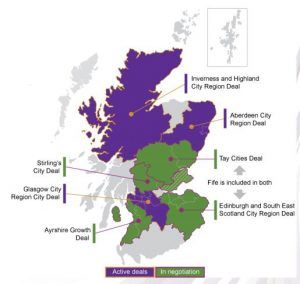
There are five City Region Deals agreed or at an advanced planning stage in Scotland
As a forum for more than 250 cross-sector organisations in Scotland that are concerned with the regeneration of Scotland’s most deprived communities, SURF has followed the development of City Deals in England since their 2011 announcement. We have also participated in the debate towards the most successful application of the model in Scotland.
The new report on the development of City Region Deals in Scotland by the Scottish Parliament’s Committee for Local Government and Communities is a welcome one. The report reflects much of the feedback raised by the SURF network in our formal contribution to the Committee’s inquiry.
City Region Deals have the potential to deliver an intelligent and strategic approach towards regeneration and infrastructure challenges in some of the country’s most populous economic zones. For SURF, the most welcome aspect of the model is its clearly articulated focus on inclusive economic growth, with a significant proportion of priority projects designed to deliver meaningful benefits for deprived places. We also appreciate the extensive local/Scottish/UK government collaboration behind each of the five City Region Deals across the country, which have either been formally agreed or at an advanced planning stage.
Three of the key areas of concern we raised during the inquiry are featured prominently in the Committee’s report. One is an anxiety that already struggling rural areas may be placed at further risk of being left behind. SURF contacts in parts of the country outwith City Region Deal geographies reported frustration at being excluded from what can be perceived to be “the only game in town” with regard to opportunities for new capital investment in regeneration and infrastructure aspirations. SURF also expressed scepticism around whether “a collection of city regions” is the best way to think about contemporary Scotland in public policy, given the reality that most of Scotland’s population live in its towns, not its seven cities.
The Committee’s report recognises this challenge, stating: “…it is not clear to us how the remoter, rural or other areas outwith Scotland’s cities will benefit from these Deals… areas of Scotland not currently covered by a City Region Deal may be doubly disadvantaged by displacement effects.” SURF notes, however, that the Scottish Government is developing other mechanisms to support similar ambitions in regions without cities, such as the Ayrshire Growth Deal, the Islands Bill, and the Borderlands Growth Deal.
Secondly, SURF raised an issue in the considerable time, energy and complexity involved in progressing and implementing City Region Deal agreements, including tripartite UK/Scottish/local government discussions, intra-local authority dialogue, and partnership agreements involving additional academic, public, private and third sector partners. This understandably presents a major capacity challenge, which could restrict effective community engagement. The Committee’s report agrees that existing efforts to engage with local people leave room for improvement.
Finally, SURF and the Committee agree that there are open questions over additionality. SURF shared the view that many City Region Deal funded projects, including employability support programmes and road infrastructure enhancements, would be expected to be delivered from conventional public budgets. Some SURF members felt that the Deals are little more than a ‘rebranding’ of existing public spending. The Committee report agreed that funded projects should demonstrate that they, “would not have gone forward in the same way to the same timetable without the funding obtained as part of the City Region Deal”.
As City Region Deals will be making substantial investments towards enhancing the nation’s economic performance for the next decade and beyond, SURF hopes that the Committee’s concerns will be addressed effectively by local City Region Cabinets and Committees.
A version of this statement appears in the January 2018 edition of New Start Magazine
